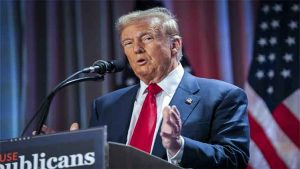
Donald Trump won all battleground states in a virtual red wall while the blue wall (Pa., Wis., Mich.) cratered for Democratic challenger Kamala Harris as she faced the greatest political comeback in U.S. history.
Trump also won battleground states of North Carolina and Georgia and was close in Nevada and Arizona, two states not yet officially called. It looks like Trump will eventually garner over 300 electoral votes. Trump is the first candidate in over a century to reclaim the White House after losing it. Trump, who won election in 2016 as the 45th president, now will be the 47th and just the second candidate in U.S. history to win nonconsecutive White House terms.
The Republican Party was on track to win the popular vote for the first time since 2004.
“America has given us an unprecedented and powerful mandate,” Trump told supporters as he declared victory.
Trump garnered even stronger support in rural America versus his still robust rural vote in this first administration. That is likely a backlash against the ag policy moves of the Biden/Harris administration that focused on underserved and minority rural citizens.
Trump also won strong support among working-class voters. The AP VoteCast survey, which included more than 120,000 registered voters nationally, showed he won 55% of voters without a college degree. That was up from 51% in 2020 in his race against Biden. Harris, meanwhile, struggled to pull together the diverse coalition that elected Biden in 2020, and she was weighed down by negative views of the economy under the Biden administration.
— It’s Trump’s GOP and his party has changed in a massive realignment. It now focuses on the working class, younger Americans, including young Black men, and Hispanics. It already focused on rural Americans; Trump gained even more rural votes in this election.
—“A new star is born,” Trump said in his acceptance speech: Elon Musk, who helped Trump and the GOP in campaign funding and messaging. It is unclear what role Musk will play in the next Trump administration, but the president-elect previously said he wants Musk to lead an effort to make the government more efficient. Of note: Musk vowed to keep his political action committee going beyond the presidential election, a sign the world’s richest person is building a political machine to support Trump.
— Republicans did much better than most expected in Senate races, with a total of 53-56 seats, up from their 49 total in the current Congress. They include:
• Jim Justice flipped the West Virginia Senate seat previously held by retiring Sen. Joe Manchin.
• Republican Bernie Moreno defeated incumbent Democratic Sen. Sherrod Brown in Ohio, giving Republicans another key pickup.
• In Montana, GOP candidate Tim Sheehy beat incumbent Sen. Jon Tester.
• Mike Rogers of Michigan is ahead of current Rep. Elissa Slotkin to fill the seat of retiring Sen. Debbie Stabenow (D-Mich.).
• Republican Dave McCormick in Pa. is leading incumbent Democrat Bob Casey.
• In Wisconsin, incumbent Tammy Baldwin, a Democrat, was in a close race with her GOP challenger, Eric Hovde.
• In Nevada, a close race was still not called between Democratic incumbent Jacky Rosen and GOP challenger Sam Brown.
• Current GOP Sens. Deb Fischer (Neb.) and Ted Cruz (Texas) both won their races that Democrats thought they had a chance of winning.
— What the GOP Senate tally means: This will mute to some degree GOP Senate moderates in the new Congress, including Sens. Susan Collins (Maine), Lisa Murkowski (Alaska), newly elected John Curtis (Utah) and Bill Cassidy (La.). The Senate GOP count gives Republicans powerful leverage in tax and spending battles.
— Several House races are still too close to call, but it appears Republicans will hold on to its narrow majority in the chamber. But Democrats were leading in some close races and several California races could still tip the House chamber to the Democrats. If the GOP keeps control of the chamber, that means another contentious House Speaker vote perhaps changes in its rules.
— Election winners include:
• Trump and his campaign strategy. Also, Trump’s victory coattails helped Republicans win a few Senate contests previously mentioned and helped keep the House in GOP control.
• GOP issues, including the border, tax/economic/inflation policy, energy, reduced regulations and a push for a reciprocity trade policy.
• Sen. Steve Daines from Montana played a significant role in the 2024 Senate races as the chairman of the National Republican Senatorial Committee (NRSC). In this position, he was responsible for leading the Republican efforts to flip control of the Senate from Democratic to Republican majority.
— Losers include:
• Kamala Harris who mostly refused to answer questions and make clear the policies she wanted. Her strategy of focusing on abortion and women voters was not enough to beat Trump.
• Former House Speaker Nancy Pelosi (D-Calif.), who led the maneuvers to get President Joe Biden to relinquish his re-election run for president and pushed Harris to pick Tim Walz of Minnesota as her vice president when election experts thought she should have picked Pa. Gov. Josh Shapiro.
• Harris’ campaign strategy that at the end relied on elite musical entertainers, a failed strategy that Hillary Clinton also tried. Nearly $16 billion were spent this election season, with Democrats spending a lot more than Republicans. The GOP saw the benefit of podcasts, which were a free way of getting their message across to voters.
• Pollsters who underestimated Trump voters for the third consecutive presidential election. Another loser: Iowa pollster Ann Selzer, who on Saturday predicted Harris over Trump in Iowa by 3 points; Trump won the state by double digits. Her poll turned out to be an outlier.
• President Biden’s family who helped push him to run for re-election only to wait until it was very late to see him pushed aside and forced to drop out.
• Most of the mainstream (legacy) media who clearly favored Harris and did several things that showed their bias.
— Now what?
• Trump should have learned from mistakes during his first term and will not likely make poor choices of some Cabinet and other personnel who ended up writing negative books about him.
• Trump’s Cabinet: The new GOP Senate next year will be able to provide the votes for Trump to get the Cabinet he wants. Unclear is what role RFK Jr. will play in Trump 2.0. He would not likely be confirmed by the Senate for any Cabinet position.
• High odds that a Trump favorite, Doug Burgum of North Dakota, will come into Trump 2.0 administration, perhaps as Energy Secretary, Burgum will bring ag-related interests relative to the RFS and tax incentive programs like 45Z/Sustainable Aviation Fuel (SAF). On global climate policy, Carbon Brief said Trump’s return to the White House would likely result in the U.S. missing its climate pledges “by a wide margin,” though it noted that some Biden administration policies such as a mammoth clean-tech spending program may “prove hard to unpick.”
• The lame-duck session of Congress may be encouraged to complete lingering business, including fiscal year (FY) 2025 funding, disaster aid, and perhaps a new farm bill and an ag economic aid measure.
• Foreign policy: Trump will take a more aggressive role in foreign policy rather than the near pacificist approach taken by Biden/Harris.
• Supreme Court: In the next few years, one to several existing SCOTUS members could likely depart.
• Republicans are now in position to reshape the federal judiciary.
— Budget reconciliation: With Republicans capturing the White House and Senate, and perhaps keeping control of the House, that means several budget reconciliation measures until 2026 elections could alter that situation. That means higher odds that Trump will get a lot of what he wants relative to 2017 Tax Act policies which mostly expire at the end of 2025.
— During the first days of his second term, Trump will issue executive orders dealing with border issues and energy-related matters, topics which Biden altered in recent years. Trump will also put into play that for every new regulation, up to ten regulations must be swept away.
— The ag sector will focus on Trump 2.0’s trade policy. Trump has said “tariffs” is his favorite word in the dictionary and has consistently said he would use them against China. He has also said he would put 10% to 20% tariffs on imports from other countries, but that is seen as leverage in discussions with countries for a key goal of his new term: reciprocal trade agreements. Key will be if former U.S. Trade Rep Robert Lighthizer comes into the new Trump administration as most expect and if so, under what role. It may be as Commerce or Treasury Secretary. Trump recently said he would slap on tariffs against Mexico if their new president doesn’t comply with holding illegal immigrants into her country.
— International reactions to Donald Trump’s return to political prominence:
• Israeli Prime Minister Binyamin Netanyahu referred to the outcome as “history’s greatest comeback,” signaling strong approval and a continued bond between the two leaders.
• Indian Prime Minister Narendra Modi referred to Trump as a “friend,” reflecting close ties and potentially anticipating cooperative efforts.
• Cautious optimism from Western leaders: France, Britain, and Italy’s leaders expressed a diplomatic hope for future collaboration, signaling their willingness to maintain stable relations with Trump while hedging their tone.
• Far-right leaders in Europe cheered, indicating ideological alignment or a belief that Trump’s policies resonate with their political goals.
• Measured Response from Ukraine: Ukrainian President Volodymyr Zelenskyy gave restrained praise by highlighting appreciation for a “peace through strength” approach. This suggests caution from Zelensky, likely stemming from Trump’s past relationship with Russia and potential implications for Ukraine’s security situation.
— Market reactions:
• Bitcoin is bullish on the news as Trump and Musk are supporters. Bitcoin jumped to a record high above $75,000.
• U.S. equities will likely show a continuation of higher levels as Trump’s wins will mean better tax/investment opportunities than if Harris had won.
• Banks, brokers: Robust stock markets and an end to the Biden administration antitrust crackdown should mean more profits for banks and brokers… and less regulation. Bank of America, Citigroup, Morgan Stanley, JPMorgan Chase, Charles Schwab and Goldman Sachs are all up 6% or more in premarket trading.
• Treasury yields jumped, and the dollar surged on the election results (While Trump has advocated for a weaker dollar, many investors say his policies will achieve the opposite). Treasury yields are soaring on the view that Trump’s agenda — more spending, low taxes, tariffs, restricted immigration — will fuel inflation. The 10-year US Treasury note edged towards 4.5%, a level not seen in about six months, before pulling back a bit. Bitcoin spiked to a record and the Mexican peso lost as much as 3.5%.
• Oil, gold: A stronger greenback makes dollar-denominated commodities more expensive for international buyers, so crude and precious metals are falling.
• The yuan weakened the most in two years and Chinese stocks fell on the specter of Washington slapping tariffs of up to 60% on Chinese goods. The move could further weaken the world’s second-largest economy and disrupt global supply chains.
• Ag markets will be cautious over Trump’s aggressive trade policies. Soybeans dropped given concerns about trade tensions with China, the biggest buyer.
• Federal Reserve policymakers will watch to see if Trump’s policies via across-the-board tariffs and aggressive tax cuts are inflationary.
— A key state ballot issue in South Dakota is poised to have gone against carbon pipelines. This referendum let voters decide whether to uphold a pipeline bill that was passed by legislators. With 82% of votes in, 60% have voted no and 40% voted yes. A no vote would mean the state law in question would be rejected and that raises fresh questions about the Summit Carbon Solutions pipeline and similar projects.
You can now read the most important #news on #eDairyNews #Whatsapp channels!!!
🇺🇸 eDairy News INGLÊS: https://whatsapp.com/channel/0029VaKsjzGDTkJyIN6hcP1K























